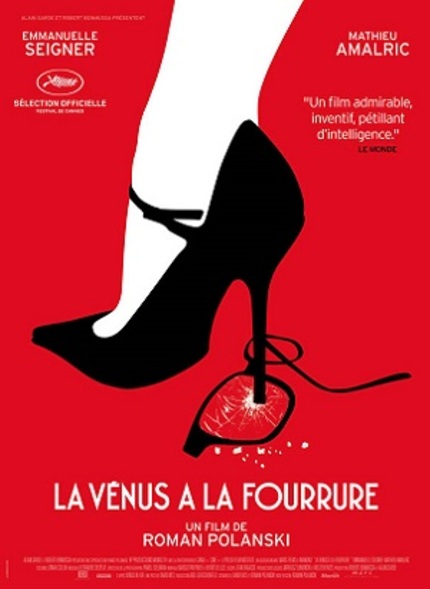Lisbon & Estoril 2013 Review: Polanski's VENUS IN FUR Does Brilliantly With Very Little

One could easily make the case that Roman Polanski is one of the very few living filmmakers with enough credentials to make a film based on a play based on a 19th century novel that would be the basis for the modern concept of masochism. If we bypass all the personal scandals and tragedy that have paved his life and career, and focus purely on the work he's produced for the past fifty years, it becomes pretty clear that the Polish-French master understands perversion like very few do. It's very much a defining trait in most of his films, which have pushed boundaries and made us confront our own notions of good and evil, right and wrong, or even made us wonder if those aren't actually just dogmas we invented to avoid killing each other on a daily basis - which we still do. Polanski understands the nuances and the complexity of the human psyche on a very deep level, which makes Venus in Fur a film that could hardly have been made by anyone else.
Adapting a play isn't really news for him, either; only two years ago, Carnage made the transition from stage to screen under his wise and quick-witted direction, turning out to be one of the funniest and craftiest films of that year. Here, the adaptation comes from David Ives' Tony-winning 2010 stage version of Austrian writer Leopold von Sacher-Masoch's 1870 "Venus in Furs", a novel about a man who submits himself as a slave to the woman he loves. And so masochism was born - the term, anyway. Ives' play, with a bit of meta thrown in, put a playwright and the actress auditioning for the lead in his new play (based on Sacher-Masoch's novel) on the same stage, going head-to-head in a literature/theater hybrid of sorts. Polanski then comes in and adds cinema to that bonfire, basically filming an audition between an actress and a director in an empty Parisian theater reading from a book that was written a century earlier.
Mathieu Amalric is Thomas, the frustrated and tired writer-director trying to pull off this daring adaptation. It's been an exhausting and unproductive day of auditions and as he's preparing to go home to his fiancée, Vanda (Polanski's wife Emmanuelle Seigner) walks in. Effusive and wet from the rain, she manages to impress him with her grasp on the character (also named Vanda) and understanding of the source material, allowing her a chance at a last audition. There's no one else around, so Thomas reads the role of Severin, the masochist writer, and soon they're reading through the whole play. Walking in and out of character, the line between reality and fiction as well as the roles of master and servant, male and female, become increasingly blurred.
Polanski's gift to create tension and, more importantly, take advantage of a very organic sense of claustrophobia has never been this effective. Venus in Fur, in the vein of Hitchcock's Rope and Mankiewicz's Sleuth, is cinema stripped down to its very basics, devoid of gimmicks and completely dependent on its players and its director's ability to make them pop. It makes sense that a filmmaker who's been doing this for so many years would, at the age of 80, turn to a very crude type of filmmaking (the kind that Portuguese master Manoel de Oliveira has been doing for decades) for the simple fact that, as the saying goes, less is often more. His direction and inherent mastery of mise-en-scène manages to make the film flow perfectly, avoiding dullness from the minute we walk in the theater to the one we exit it (quite literally), enthralling us and also amusing us. The film is as gripping as it is fun, with its sharp and quick humor that always feels quite natural and self-conscious. As Thomas and Vanda dive into their characters, they will often pause and kind of time-travel back into the 21st century to comment on the ideas and concepts present in Sacher-Masoch's novel with their own current world-views regarding femininity, power dynamics and sex, which makes for delicious banter and self-reflexivity.
It's that power struggle between the two, where one submits him/herself and the other dominates, switching back and forth, that drives the film and makes it as thrilling as Polanski's classics. Eventually, we get to a point where it becomes unclear as to who's in control - and who is who, really - which infuses the film with a unique ability to surprise and, again, amuse. Seigner has a lot to do this unpredictability, creating a role (within a role) that is the very embodiment of female beauty and mystery, often mimicking the goddess she's asked to portray. She may not be a stranger to the femme fatale mold, but here she has so much more to work with, alternating between naiveté and crushing dominance in effortless fashion. Then there's Amalric's awkward and tortured artist, who, while always seeming easy to manipulate, also hides a lot more under the surface. The chemistry between the two (reuniting here after Julian Schnabel's The Diving Bell and the Butterfly) is electrifying and eye-popping in its own, but it's what they do with that chemistry that helps to elevate the film, deconstructing gender roles and highlighting how fragile and volatile they actually are.
Venus in Fur is a testament to the value of simple, uncluttered filmmaking. The idea that all you need is a setting, talented actors and an understanding of the story you're trying to tell isn't, ironically, always easy to demonstrate, but Polanski, having the experience of working on a scale as large as they come, has done it beautifully - again. Not only does it match what he had done with Carnage (and that film had four leads), it improves on it while also making a statement, conscientious or otherwise, about the interchangeability nature of all art forms.

Venus in Fur
Director(s)
- Roman Polanski
Writer(s)
- David Ives (play)
- Roman Polanski (screenplay)
- David Ives (screenplay)
- Leopold von Sacher-Masoch (novel)
Cast
- Emmanuelle Seigner
- Mathieu Amalric







